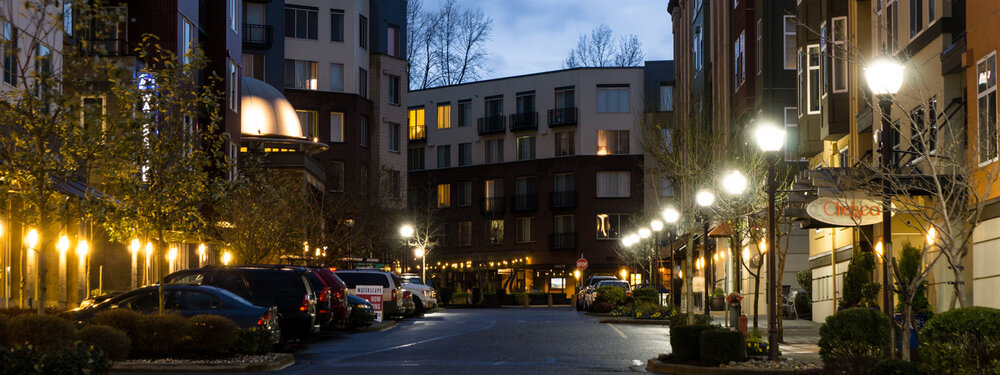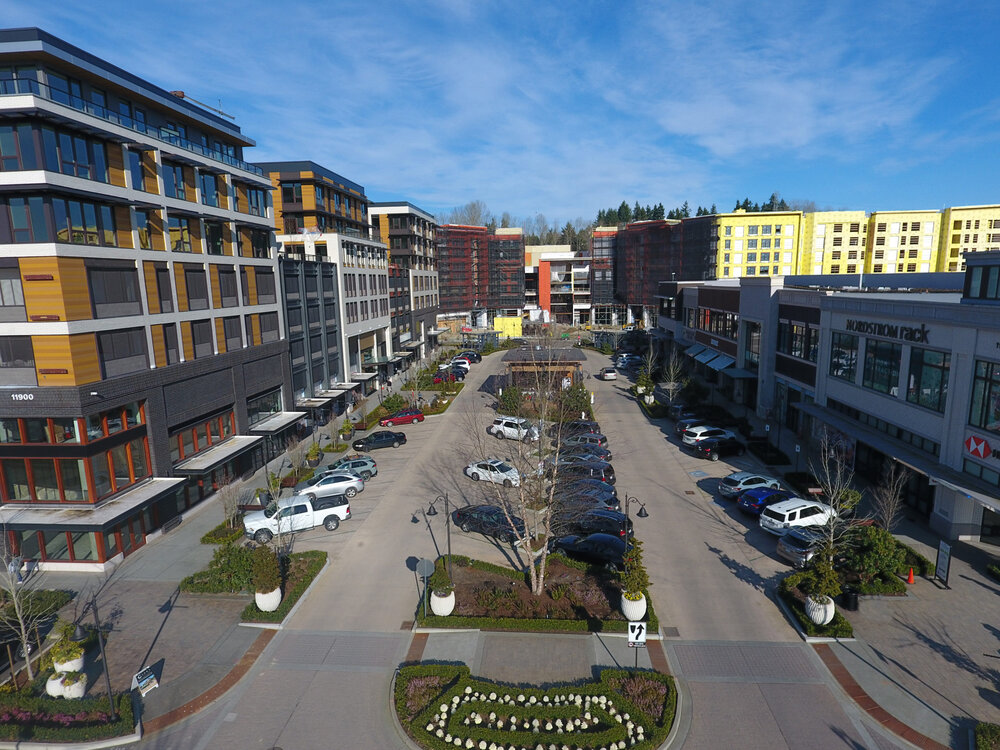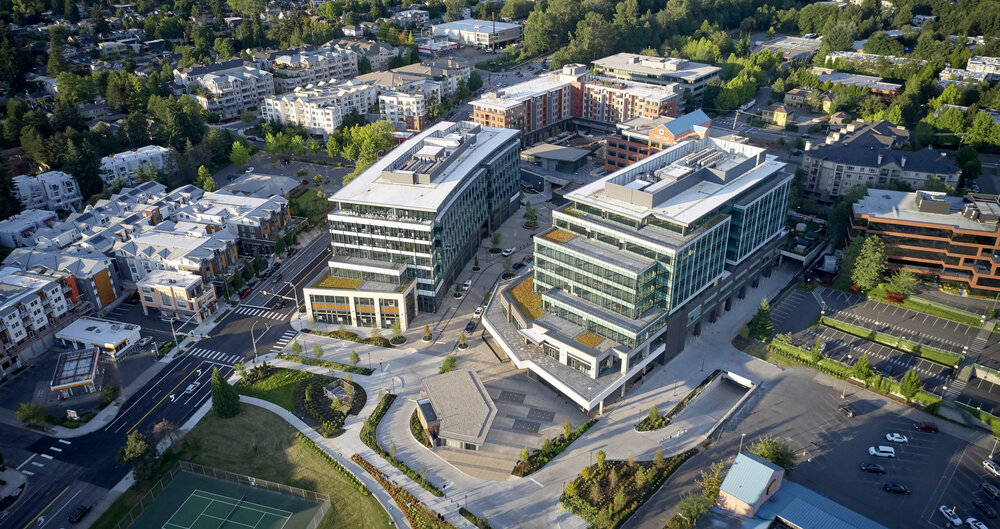
The future of this Eastside city appears likely to include population, housing, and retail and commercial property growth
Kirkland, like other Eastside cities, had been growing at a rapid clip before the COVID-19 pandemic.
The city’s 2019-20 biennial budget refers to that growth in noting that one of three drivers of the $793 million budget was the need to provide infrastructure and services that respond to the unprecedented growth in jobs, housing, and commercial properties.
While there’s no question the pandemic has hurt governments and businesses across the region, it might be too soon to say what effect, if any, the COVID-19 pandemic will have on future growth.
According to the city’s website, Kirkland was expecting a growth spurt to accommodate 8,361 new housing units and 22,435 new jobs by 2035, which averages out to about 363 housing units and 975 jobs per year, based on an earlier estimate roughly covering the period 2015-35. For comparison, from 2006-11 the city gained about 1,500 units for the six-year period.
Kirkland enjoys a broad-based, service-oriented economy, according to Lorrie McKay, the city’s intergovernmental relations and economic development manager, who spoke for this story in early March before the pandemic swept the nation. Business clusters with the highest concentration of employees include professional, scientific, information, and technical services. Google, which has been expanding its offices downtown, is among the notable growth stories.
Kirkland is growing and prospering, Jim Lopez, assistant city manager, said in the same prepandemic interview.
“We’re moving into that prosperity in a way that’s planned,” Lopez said of government plans guiding the 18-square-mile city bordered by Lake Washington to the west; Bellevue to the south; Redmond to the east; and Kenmore, Bothell, and Woodinville to the north.
“We have vision embodied in those plans, and I think the development you’re seeing is being lived out through that vision, so it’s development going where we’ve planned it to go,” Lopez said. “The theme of our last budget was safe, sustainable, and connected — and I think you’re seeing all of those three themes play out as we grow as a community.”
The growth shows in population: 88,940 in April 2019, according to a Washington Office of Financial Management estimate. The population in 2010 was 48,787. While population jumped 82 percent in nine years, the city in June 2011 annexed land to its north — Finn Hill, Juanita, and Kingsgate — which increased its area and population by more than 60 percent, according to city documents.
Nonetheless, the growth is pronounced, as evidenced by population, job growth, and construction.
Large construction projects, like the Village at Totem Lake at Interstate 405 and Northeast 124th Street and Kirkland Urbandowntown, are two prominent developments changing the landscape with dense infill development. The city also has begun planning for how development might look around the planned Bus Rapid Transit (BRT) station at I-405 and Northeast 85th Street. The planning area extends in roughly a half-mile radius around the station, providing an opportunity for transit-oriented development.
A lot of Kirkland’s planning work and energy moving forward are around the transformational proposed station, Lopez said.
WSDOT and Sound Transit are working on the design for the station, which is slated for completion in 2024, according to Allison Zike, senior planner for the city.
It’s too early to say how that area around the station will ultimately look, Zike said in the same interview with Lopez and McKay.
The city is in the second phase of its public engagement plan. A live online design charette was planned for June 4, and an interactive StoryMap was set to be published and available June 5-16.
“We don’t have any numbers or projections yet,” Zike said in March. “We’re really waiting to see what the community wants there, what the market will support, and what uses will best support the regional transit investment.”
Current land uses in the study area include a mix of multifamily, mixed-use, commercial/retail/office, schools, parks, and lower-density single-family residential, according to the city’s website.
Puget Sound voters in 2016 approved the Sound Transit 3 plan, making BRT on the I-405 corridor possible, the website said, and BRT will allow for improved connections and commute times between Lynnwood, Kirkland, Bellevue, and Burien, with the new north-south BRT service complementing the new regional light rail lines.
The I-405/85th Street Interchange will be reconstructed to comprise three levels, with the lower level for Northeast 85th Street, the midlevel devoted to transit, and the top level as I-405. The BRT Station will be accessed by buses using inline access ramps. There is a focus on transit and nonmotorized access to the BRT Station, with no park and ride planned, according to the city site. A pick-up/drop-off lot is planned in place of the northwest “cloverleaf.”

The Village at Totem Lake | Photo by David Bocock, CenterCal Properties
Village at Totem Lake
Ongoing development at the Village at Totem Lake, under construction since 2016, is targeted to conclude by year’s end, even if some tenants might not open until early next year. Village at Totem Lake is a 26-acre urban lifestyle village that will have 328,000 square feet of retail/restaurant space; 852 apartments; an 888-seat, eight-screen cinema; and 15,000 square feet of office space upon completion.
Currently, 20 tenants are open, including Whole Foods Market and Nordstrom Rack. Seven new tenants are expected to open this year; all are under construction, and several were close to completion in late May, including Lululemon and Urban Tread. The Cinemark Theatre, among those new tenants, is expected to open this fall.
“Our entire Kirkland community has felt the impact of COVID-19,” Paul Brett, general manager of village developer CenterCal Properties, said in mid-May. “A lot has changed over the past several months, and we are grateful that our tenants who are providing essential services were able to stay open and safely serve the community. And now we look forward to the time when all of our retailers can reopen in a safe way. We have put a lot of consideration into a phased reopening, as well as continuing construction of Phase II of the project.”
On the housing side, 202 units are open at Aura Totem Lake apartments. Two other complexes, the 244-unit North Totem Lake and 406-unit Aspect Totem Lake apartments, are expected to be completed by this fall and spring 2021, respectively.

Google bought most of Kirkland Urban for $435.7 million last year and now has 1.1 million square feet of office space in the city, the Puget Sound Business Journal reported in January. | Photo Courtesy Ryan Companies US, Inc.
Kirkland Urban
Kirkland Urban, a mixed-use project on 11.5 acres at 400 Urban Plaza downtown, continues evolving. Google last fall announced it purchased a chunk of mixed-use office/retail space there and, before the pandemic, was to begin moving into two new offices over the spring. Most Google employees will likely work from home until the end of this year, with the return to the office slow, deliberate, and incremental, Google confirmed.
It plans additional office space as well that should be ready for occupancy in 2022 as it transitions into the new space over the next three-plus years.
Google bought most of Kirkland Urban for $435.7 million last year and now has 1.1 million square feet of office space in the city, the Puget Sound Business Journal reported in January.
Google, which opened its first Kirkland office in 2004, will continue to maintain a presence at its current Kirkland campus, 747 Sixth St. South, for the foreseeable future, the company said. The company has grown to more than 4,500 employees across its Kirkland and Seattle offices, working on projects that include Android, Chrome, Maps, Ads, and more.
“This new campus will provide room for future growth and further cements our commitment to the Kirkland community. We’re proud to call this city home and will continue to support its growing economy,” Eric Young, Google Washington site lead, said after last fall’s Kirkland Urban purchase.
Kirkland Urban earlier this year announced its newest retailers, including Lounge by Topgolf and Restore Cryotherapy. When complete, Kirkland Urban will feature dozens of restaurants and bars, shopping, and office space, plus the 185 housing units comprising Uptown Apartments at Kirkland Urban that opened last summer. Kirkland Urban expects to welcome at least eight new businesses before the end of the year, including a brewery, restaurants, and nail salon.
Evolving technology hub
Kirkland still is a residential city, but also is fast becoming a hub for technology, Ellen Miller-Wolfe, regional business partnership manager for the city, said in the same early March interview.
Google vividly represents that, but there are many other companies, too. That technology growth drove a decision four years ago for Kirkland, Redmond, and Bellevue to establish the Innovation Triangle, a concentration of technology companies and workforce talent in the three cities.
They formed the Innovation Triangle “because we saw the future of our communities — and that includes all growth, both residential and commercial — very much tied to technology,” Miller-Wolfe said.
Even when companies don’t locate in Kirkland, many of their technology workers from Bellevue or Redmond live in Kirkland, she said.
“It’s an ecosystem,” she said of the intercity connections.
Added Lopez: “I think there is an interdependence that we’re promoting between the three communities. Quality-of-life issues flow with economic development and how we’re kind of sharing the vision of our economic growth amongst the three cities.
“We’re able to leverage the strength of each community in a way that empowers all three,” he said.
Aside from the Innovation Triangle, Kirkland is administrator of Startup 425, an initiative that includes those cities, plus Issaquah and Renton, aimed at helping startups, including women- and immigrant-owned businesses, create successful, sustainable businesses.
“Kirkland, although not as diverse as Bellevue or Redmond, is very much interested in welcoming diversity,” Miller-Wolfe said.
Startup 425 includes free classes at local libraries, and mentors. An incubator/accelerator, in partnership with Bellevue College, also had been planned for honing basic business skills and receiving customized assistance related to an entrepreneur’s business.
That’s another point of engagement for the city and its business customers to continue to build economic development beyond just larger companies, she said in early March.
SOURCE: 425Business.com
+ show Comments
- Hide Comments
add a comment